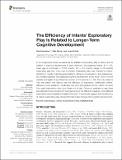The Efficiency of Infants' Exploratory Play Is Related to Longer-Term Cognitive Development
Author(s)
Muentener, Paul Jason; Herrig, Elise; Schulz, Laura E
Downloadfpsyg-09-00635.pdf (1.304Mb)
PUBLISHER_CC
Publisher with Creative Commons License
Creative Commons Attribution
Terms of use
Metadata
Show full item recordAbstract
In this longitudinal study we examined the stability of exploratory play in infancy and its relation to cognitive development in early childhood. We assessed infants' (N = 130, mean age at enrollment = 12.02 months, SD = 3.5 months; range: 5-19 months) exploratory play four times over 9 months. Exploratory play was indexed by infants' attention to novelty, inductive generalizations, efficiency of exploration, face preferences, and imitative learning. We assessed cognitive development at the fourth visit for the full sample, and again at age three for a subset of the sample (n = 38). The only measure that was stable over infancy was the efficiency of exploration. Additionally, infants' efficiency score predicted vocabulary size and distinguished at-risk infants recruited from early intervention sites from those not at risk. Follow-up analyses at age three provided additional evidence for the importance of the efficiency measure: more efficient exploration was correlated with higher IQ scores. These results suggest that the efficiency of infants' exploratory play can be informative about longer-term cognitive development.
Date issued
2018-05Department
Massachusetts Institute of Technology. Department of Brain and Cognitive SciencesJournal
Frontiers in Psychology
Publisher
Frontiers Research Foundation
Citation
Muentener, Paul, Elise Herrig, and Laura Schulz. “The Efficiency of Infants’ Exploratory Play Is Related to Longer-Term Cognitive Development.” Frontiers in Psychology 9 (May 31, 2018).
Version: Final published version
ISSN
1664-1078